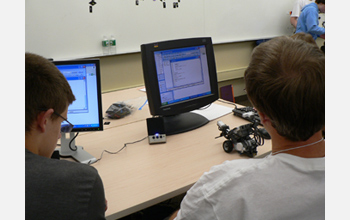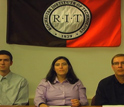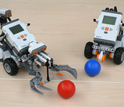|

Press Release 08-209
An ACE for Visually Impaired Students in Computer Science

Project works to increase participation of visually impaired students in computer science
November 25, 2008
View a video interview with the leaders of Project ACE, an initiative based at the Rochester Institute of Technology (RIT), which is working to help visually impaired students achieve success in computer science.
Many computing luminaries, such as Steve Jobs or Bill Gates, have an early experience in common--an engaging experience in middle school or high school that sparked an excitement for learning everything they could about computers. Today, many young people are surrounded by computing at home and in school, and some of them will likely find a similar passion that will lead them to push tomorrow's frontiers in computer science. For visually impaired students, however, the pathways to studying computer science are more complicated. While technologies can make it easier for them to use computers, the visual nature of modern computing makes it difficult for them to participate in programming courses and other types of computing instruction. These students also commonly lack the resources and preparation other students get in computing before they get to college, and there is a dearth of visually impaired role models in computing to inspire them as they pursue their degrees. Enter Project Accessible Computing Education (ACE), an NSF-funded initiative at the Rochester Institute of Technology (RIT). The project is designed to help prepare visually impaired middle school and high school students participate in computer science programs at the collegiate level. Project ACE's ultimate goal is to increase the number of visually impaired students pursuing degrees in computer science and give them the foundations they need to be fully successful in their studies and beyond. According to Stephanie Ludi, a professor of software engineering at RIT and the principal investigator for the project, in the long run, encouraging these students will benefit everyone who uses a computer. "Because of the unique perspective they have," Ludi said in an interview this month, "they can create software that is really more usable for everybody." The project is focused on three areas: better preparation for visually impaired students before college, support for these students as they face challenges in computing that other students do not, and educating teachers in how to best help these students learn and achieve. Last year, the project conducted an interactive workshop for visually impaired students and their parents called ImagineIT. The four-day workshop, held at RIT's B. Thomas Golisano College of Computing and Information Sciences, brought together more than a dozen visually impaired students and their parents from around the country and gave them an opportunity to tackle "real world" computing applications and learn about career opportunities in computing. The students worked collaboratively on a number of challenges, including building and programming Lego Mindstorm robots to interact with the environment by navigating through a maze to find a sound source. According to Thomas Reichlmayr, also a professor of professors of software engineering at RIT and co-principal investigator on the project, the workshop was helpful for everyone. "It was a good opportunity for the students," Reichlmayr said, "but also for their parents to network with other parents, to share experiences with their school districts and their own experiences as well." In addition to helping these young programmers gain a better appreciation for computer science, Project ACE also used the experience as a foundation for future workshops centered on preparing teachers to work with these students. Educators and students alike can go to the project's Web site, http://www.se.rit.edu/~imagine-it/, and find lesson plans, tutorials and other resources. Ludi says that Project ACE will repeat the ImagineIT workshop next year at RIT and also in Southern California. In the next few years, the students from the first ImagineIT workshop will enter college. According to Ludi, some of them have already expressed interest in majoring in computer science.
-NSF-

Media Contacts
Dana W. Cruikshank, NSF (703) 292-8070 dcruiksh@nsf.gov
Program Contacts
Janice Cuny, NSF (703) 292-8950 jcuny@nsf.gov
Principal Investigators
Stephanie Ludi, Rochester Institute of Technology 585-475-7407 sal@se.rit.edu
Related Websites
More information about Project ACE is available here.: http://www.se.rit.edu/~imagine-it/

The National Science Foundation (NSF) is an independent federal agency that
supports fundamental research and education across all fields of science and
engineering, with an annual budget of $6.06 billion. NSF funds reach all 50
states through grants to over 1,900 universities and institutions. Each year,
NSF receives about 45,000 competitive requests for funding, and makes over
11,500 new funding awards. NSF also awards over $400 million in
professional and service contracts yearly.
 Get News Updates by Email Get News Updates by Email
Useful NSF Web Sites:
NSF Home Page: http://www.nsf.gov
NSF News: http://www.nsf.gov/news/
For the News Media: http://www.nsf.gov/news/newsroom.jsp
Science and Engineering Statistics: http://www.nsf.gov/statistics/
Awards Searches: http://www.nsf.gov/awardsearch/
| 



